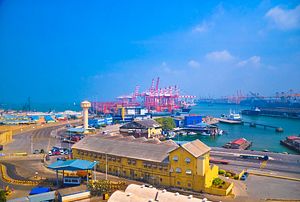Time once again for your end-of-the-week China links:
Ever since Maithripala Sirisena ousted incumbent president Mahinda Rajapaksa in Sri Lanka’s elections, observers have watched carefully for signs that the new administration will adopt a different approach to China policy. Sirisena had promised to reconsider several high profile deals signed with China during Rajapaksa’s time in office, likening the financial deals to European encroachments during the colonial period. The Diplomat has covered this issue in some detail, with pieces by Harsh V. Pant, Nitin A. Gokhale, and Ankit Panda.
In particular, the incoming Sri Lankan government previously threatened to scrap a $1.5 billion deal that would see a Chinese company build a “port city” on reclaimed land in Colombo. Now, Reuters reports, there’s an update to that position — Cabinet Spokesman Rajitha Senarathne told reported Sri Lanka was “reassessing the deal.” Explaining further, Senarathne said, “We need to see the feasibility study. We need to see the environmental impact assessment (EIA) and reassess the tax concessions given to it and land ownership issues.” Under the original terms of the deal, the Chinese firm (China Communications Construction Co.) would be given 20 hectares of reclaimed land and would receive another 88 hectares under a 99-year lease. Senarathne did say the government would be open to renegotiating the deal after Sirisena’s administration makes its own assessment.
The Colombo port city project is offered mentioned as part of the “string of pearls,” commercial ports that China is supposedly also eying as military bases. National Defense University’s Christopher Yung, writing for The Diplomat, makes it clear the “string of pearls” theory has little connection with reality. Summarizing the findings of a report he co-authored with Ross Rustici, Yung writes:
“We believe China is unlikely to attempt to dominate the Indian Ocean region militarily. Even if it does harbor such ambitions, the ‘String of Pearls’ model would be insufficient to support the logistics needs of a large Chinese air and naval force focused on combat operations. China would need a much more robust logistics infrastructure to support such a force… ‘The ‘String of Pearls’ model has long outlived its usefulness as a strategic concept!”
And speaking of Chinese investment, the Investment Coordinating Board of Indonesia called Chinese companies onto the carpet for not living up to their investment promises. “Out of the planned US$18.4 billion Chinese investment here in the last five years, only $1.1 billion, or 6 percent, has materialized,” the board says, according to The Jakarta Post. That means, in terms of realized investment in Indonesia, China has been outperformed by Japan, South Korea, Malaysia, Mauritius — even Taiwan. Still, the board said it expects China to move from its current ranking as the 13th largest investor in Indonesia all the way up to third.
The Liaoning: It’s the pride of the People’s Liberation Army Navy, China’s one and only aircraft carrier. And back in 1998, it was an unfinished hull in Ukraine’s Nikolayev South Shipyard when a Chinese businessman purchased the vessel – purportedly for use as a floating hotel and casino. The strange story of how the aircraft carrier, originally dubbed the Varyag, wound up as China’s Liaoning is the subject of a fascinating two-part series in South China Morning Post. Part One looks at how the carrier was purchased; Part Two recounts how it made the journey to China (a process that took nearly three years). For the piece, SCMP interviewed Xu Zengping, the former PLA basketball player turned businessman who bought the Varyag on the PLAN’s behalf – and lost $120 million on the deal.
To purchase the Varyag, SCMP says, Xu had to outbid other interested parties – including representatives from the U.S., Australia, South Korea, and Japan. Robert Farley, writing for The Diplomat, poses the intriguing question raised by these reports: What if China hadn’t been able to secure the Varyag?
Earlier this week, I covered China’s quest to create globally influential think tanks. As a sign of how far China has to go, I cited the 2013 Global Go To Think Tank Index Report. The 2014 version was released two days later, and China’s think tanks fared even worse in the updated report: its top-ranked think tank, the Chinese Academy of Social Sciences, dropped from 20th to 27th in the global rankings.
































